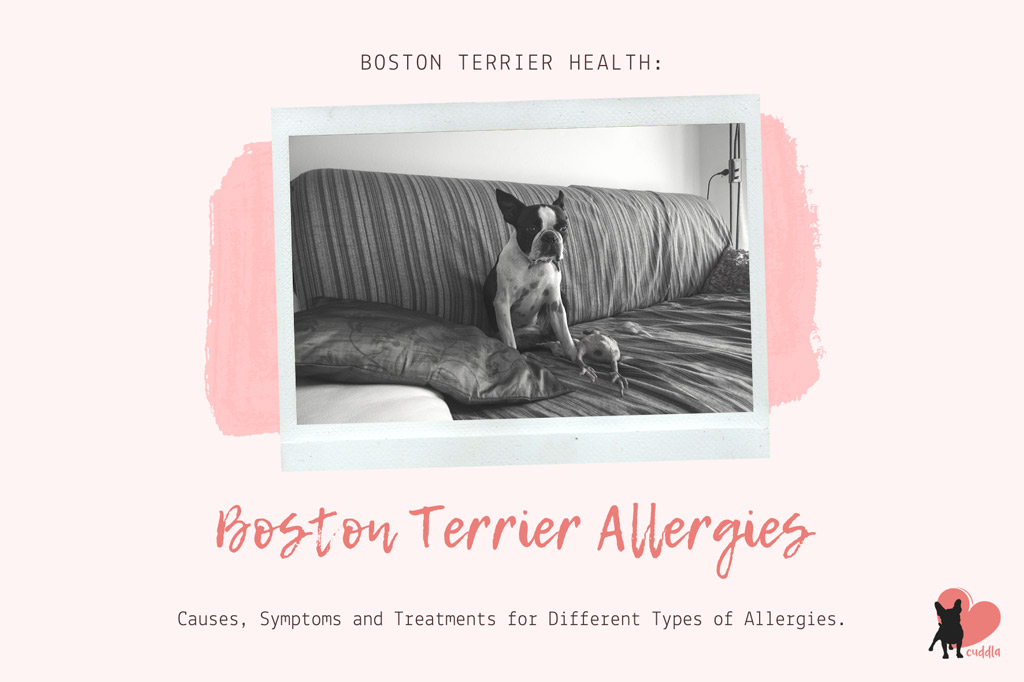
Boston Terriers have sensitive skin and are prone to allergies. But it doesn’t mean you cannot prevent them or alleviate the symptoms.
As dog owners, there are many things we can do to keep allergies at bay!
Let’s have a look at the types of allergies, what causes them and the natural treatments and solutions available.
Boston Terrier Allergies
An allergy is a response from the immune system to a foreign substance (source). These foreign substances are called allergens.
Allergies can develop at any age. They often require years of exposure to an allergen before a sensitivity develops, particularly with food allergens.
Let’s see what causes your Boston Terrier’s immune system hypersensitive response.
Boston Terrier Allergy Causes
Allergies can have multiple causes.
Dogs have a genetic predisposition to develop allergies, but the environment can also affect that predisposition and then the development of allergies.
Your dog’s allergy can be caused by allergens or be inherited condition.
- Allergens: These are the foreign substances that your dog’s immune system reacts to. Refer to Common Allergens for Boston Terriers list below. 😉
- Genetics: Some allergies are thought to be inherited (source). If one of your Boston Terrier’s parents have an allergy, your dog has a 30% chance of being allergic; the risk increases to 60% if both parents have this sensitivity. A reputable breeder should be able to tell you whether your Boston Terrier’s parents have allergies.
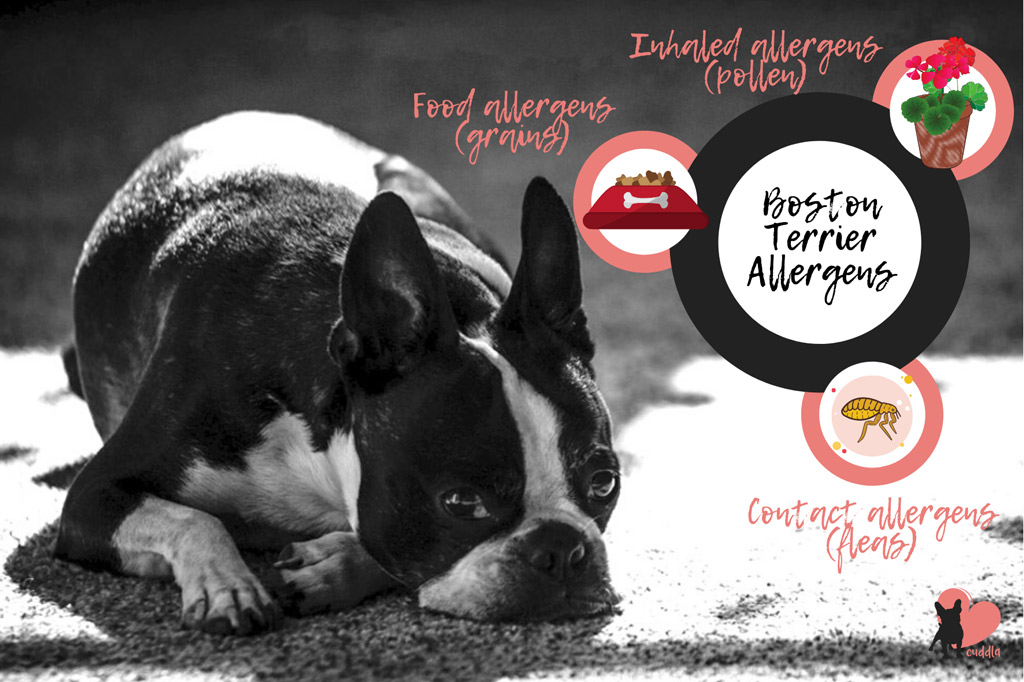
Common Allergens for Boston Terriers
A very large number of substances can act as allergens. But most allergens are proteins from insects, plants, or animals. Also, chemicals can cause allergy (source).
Here is a variety of substances that can cause allergic reactions in Boston Terriers:
- Food allergens:
- Grains (gluten) such as corn and wheat.
- Soy.
- Food additives.
- Inhaled allergens:
- Pollen.
- Smoke.
- Perfume.
- Household mould.
- Dust mites.
- Contact allergens:
- Plants and grass.
- Dander.
- Dog shampoos and conditioners.
- Household cleaning products.
- Parasites like fleas.
Common indoor allergens can be found everywhere in the home, from the bedroom to the basement, and from the attic to the living room. Identifying the most problematic allergens and eliminating them from your house is a great start. From there, you’ll be able to identify potential sources and take action (source).
However, puppies that have been treated with antibiotics could develop allergies later on.
This is due to the effect that this medication has on a dog’s gut. Antibiotics change the environment inside the gut by damaging the beneficial bacteria that plays a role in the immune system.
“The antibiotic could be a predisposing cause, but then the trigger would be being exposed to the allergen.”
Susan Wynn, an expert on holistic pet care.
Types of Boston Terrier Allergies
Boston terriers can suffer from a variety of allergies, including contact, inhalant and food allergies. Some dogs can experience several allergies simultaneously.
Here are the most common types of allergies for a Boston Terrier:
- Skin allergies.
- Food allergies.
- Environmental allergies.
Causes and symptoms vary, but they also can overlap.
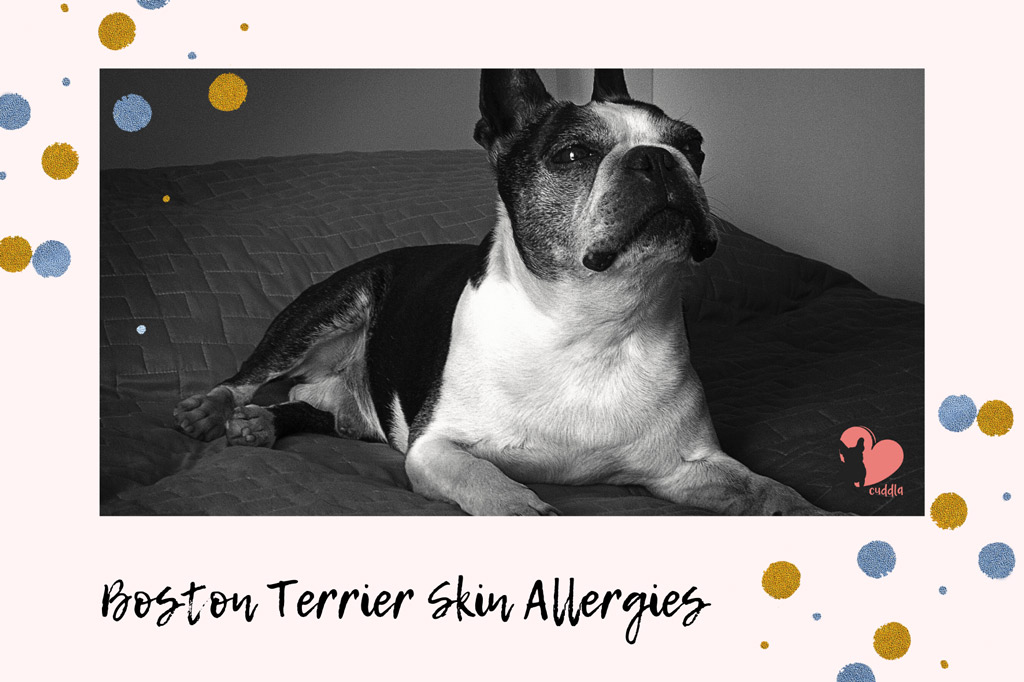
Skin Allergies
Boston Terriers are more susceptible than most other breeds to Atopic Dermatitis.
Allergic dermatitis (also called atopic dermatitis) is a skin irritation caused by an allergy.
A primary location for allergic reactions is the skin itself which, when inflamed from exposure to an allergen, can become red, flaky, and itchy.
Then, the inflammation can spread to the belly, ears, and legs.
Cause
Due to their hypersensitive immune system, the Boston Terrier can develop allergies from a wide range of sources.
Refer to the Common Allergens for Boston Terriers list above.
Symptoms
Regardless of what type of allergen it is, the most common manifestation of allergies in dogs comes in the form of itchy, irritated skin.
Common symptoms include:
- Redness of the skin.
- Hair loss.
- Skin rash, infections, and irritation.
- Unusual odour on the skin.
- Skin thickening and colour changes.
- Ear infections.
- Scales and crusts on the skin.
To find relief, your Boston Terrier is likely to repeatedly bite, lick, chew, and/or scratch the affected area.
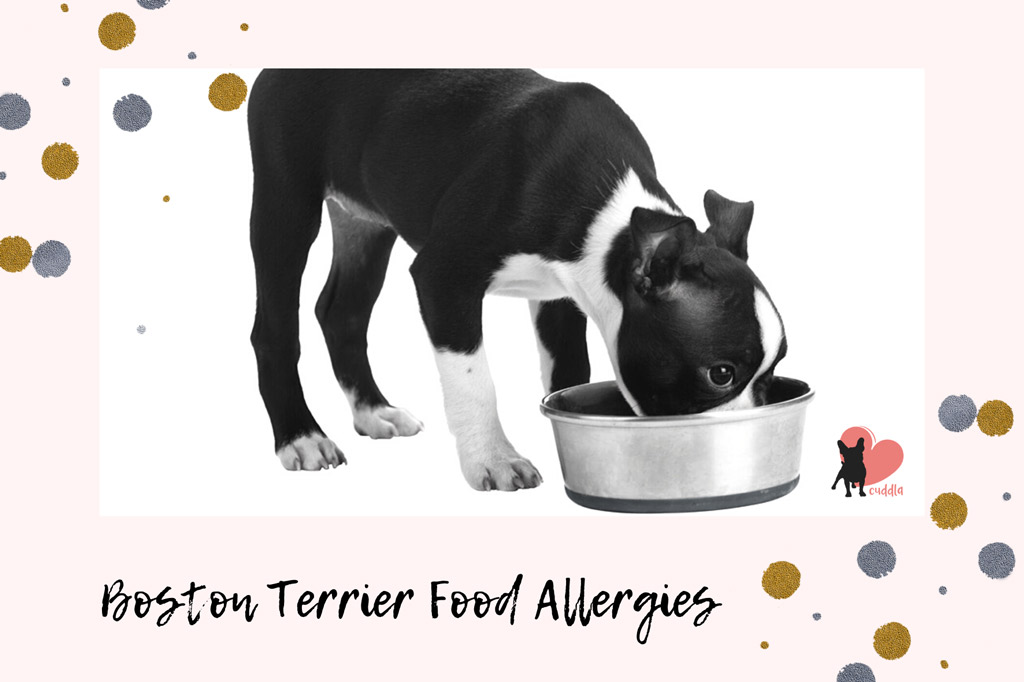
Food Allergies
According to WebMD, 10% of all allergy cases in dogs are food allergies. However, dogs can also suffer from food intolerance, which is different from a food allergy.
Your pooch can suddenly develop a food allergy to something that he’s eaten for years with no problems. Your Boston has to be sensitised, i.e., he has to have been exposed to it for some period of time. He won’t react dramatically out of the blue, but he will start showing allergic symptoms.
Boston Terriers can have sensitive stomachs and can develop food allergies. The itching may be accompanied by flatulence too (another concern related to diet).
Cause
Food allergies are something that is difficult to identify unless one is well aware of the baseline information with regard to this type of allergy.
However, there are certain ingredients and foods that have been proven to cause allergies in dogs (source):
- Grains (gluten), including corn, wheat, oats and barley.
- Rice (gluten).
- Soy.
- Dairy (milk, yogurt and cheese).
- Food additives.
- Colouring agents.
- Animal protein (beef, egg, chicken, lamb, pork, rabbit, and fish).
- Etc.
All the ingredients above are found in processed pet food like kibble.
Although there are many recorded incidences of allergies to corn and wheat, food allergies can vary from dog to dog.
Symptoms
Allergic reactions mostly involve the skin or/and the gastrointestinal tract. The main symptoms of food allergies in dogs include:
- Facial itching.
- Limb chewing.
- Belly itching.
- Skin infections.
Signs of food allergies in Boston Terrier dogs include not only Atopic Dermatitis but also:
- Recurrent ear infections.
- Vomiting,
- Diarrhoea.
- Flatulence*.
*Note: For Boston Terriers, a food allergy or intolerance can cause your dog to be gassy. The top causes of flatulence in Boston terriers are corn and soy, grains that are frequently found in commercial dry dog foods.
Read also: Best Diet for Boston Terrier with a Sensitive Stomach.
Celiac Disease
Some Boston Terriers also suffer from Celiac disease, which is similar to food allergies in symptoms and treatment.
The cause is an intolerance of any kind of gluten, regardless of source. Remember that gluten can come from grains or rice.
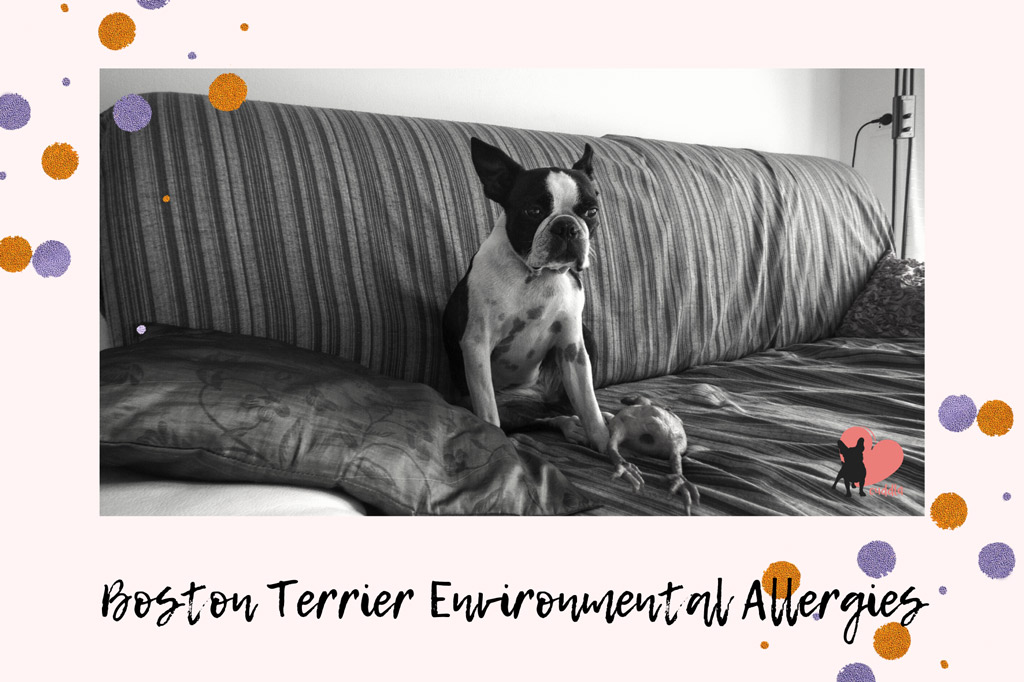
Environmental Allergies
Allergic reactions may happen when your dog is exposed to environmental allergens. These can be contact or inhalant allergies.
These are what we call Seasonal Allergies and they generally occur at certain times of the year. Many of these allergies occur seasonally, such as pollens.
However, others such as moulds, mildew, and house dust mites occur year-round.
Cause
Depending on the type of environmental allergy, the causes vary:
- Contact allergy: It’s the least common type of allergy in dogs. It results from direct contact to allergens such as:
- Pyrethrins found in flea collars.
- Pesticides used on the lawn.
- Grasses.
- Materials such as wool or synthetics used in carpets or bedding.
- Insect bites (including flea bites).
- Etc.
- Inhalant allergy: The main inhalant allergens are:
- Tree pollens (cedar, ash, oak, etc.).
- Grass pollens.
- Weed pollens (ragweed).
- Moulds.
- Mildew.
- House dust mites.
Symptoms
Although sometimes the symptoms of inhaled allergies include allergic rhinitis or bronchitis, in most dogs, inhalant allergy manifests with itchy skin (pruritus).
Also, some dogs may get red, irritated eyes or watery eyes.
For contact allergies, the symptoms are those of itchy skin (refer to Skin Allergies Symptoms above). They mostly affect the feet and the stomach.
Read also: How to Make Your Home Dog-Friendly and How to Make Your Garden Dog-Friendly blog posts.
Flea Allergy
Insect bite allergy is the exaggerated inflammatory response to the bite or sting of an insect:
- Arachnids such as spiders and ticks.
- Insects including fleas, blackflies, deerflies, horseflies, mosquitoes, ants, bees, hornets, and wasps.
All these can cause an allergic reaction in sensitive Boston Terriers. However, flea saliva is the most common insect allergen in dogs, causing Flea Allergy Dermatitis (FAD).
If most dogs experience minor local irritation from flea bites, a FAD dog will react to a single bite with severe local itching.
Such a severe reaction can cause:
- The removal of large amounts of hair, especially in the tail-base region.
- Secondary bacterial infection in the areas of broken skin.
Read also: Dog Parasite Prevention and Treatment – Worms, Fleas, Ticks – includes flea treatments.
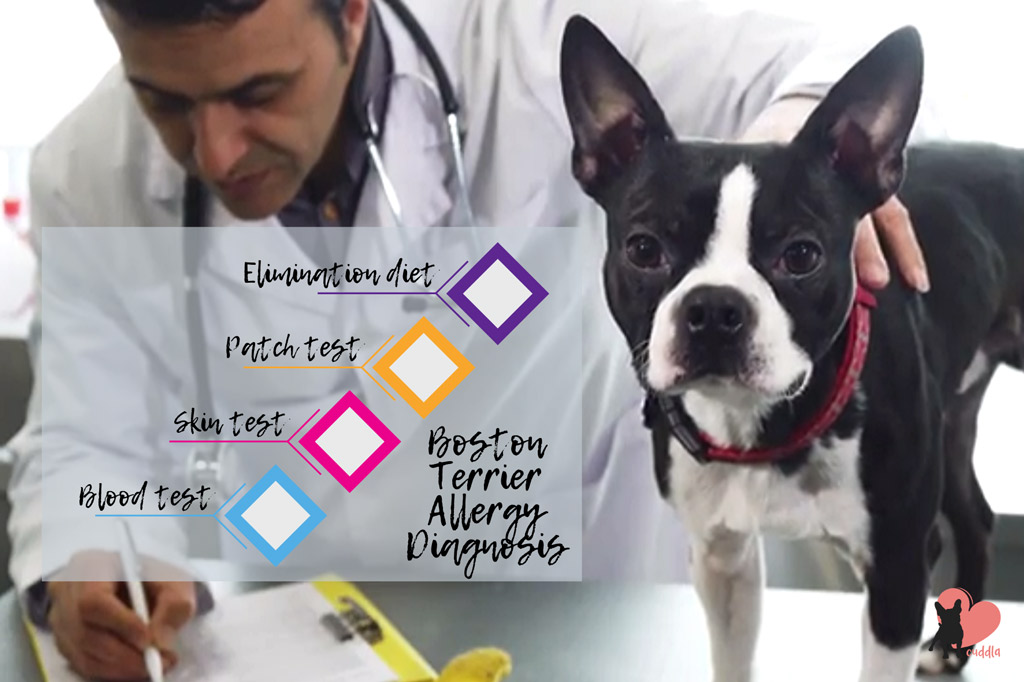
How to Diagnose Boston Terrier Allergies
As you have read, all allergies can cause similar symptoms.
This is why your vet may need to start with diagnostics to first rule out parasites, fungal infections and endocrine illnesses.
Then, it’s time to identify what is causing the allergy and what type of allergy it is.
There are four different options:
- Blood tests: Blood testing is not an accurate test for any allergy.
- Allergy tests: They are usually run by a veterinary dermatologist (usually offered in a dermatology clinic). There are two options:
- Patch tests: Patch tests are generally more accurate than blood tests. A protein (e.g. beef) is mixed with petroleum jelly and taped on the skin for about two days, then tested a day later. If there are signs of irritation (redness, hives), it’s considered a positive test; if not, it’s negative.
- An intradermal skin test: In this case, a small number of allergens are injected under your dog’s skin. Allergens are identified by which injections cause redness, swelling or hives.
- Elimination diet: This is a trial and error that dog owners can try to find which food is causing an allergic reaction. This option consists of taking away all your dog’s food and replacing it with food that your pooch has never eaten before. Once your dog’s allergy has improved, start reintroducing the old foods that you think caused the problems in the first place. If he has a reaction, which usually takes a few days to a few weeks, then you know he has a food allergy.
Although allergy tests are expensive, they are a quicker way to discover what your Boston Terrier is allergic to than the elimination diet.
Also, since many Bostons Terriers have inhaled or contact allergies as well as food allergies, an allergy test can be a better way to go about finding the list of allergens.

Boston Terrier Allergy Treatments
Without appropriate treatment, your Boston Terrier can suffer chronic itchiness, discomfort, infections, and skin damage.
Once you know what your Boston is allergic to, you can start eliminating or reducing his exposure to allergens.
Here are four different approaches to allergy treatment (source):
- Avoidance therapy.
- Symptomatic therapy.
- Immunotherapy.
- Immunosuppressive therapy.
Avoidance Therapy
This is the most natural approach.
Basically, it means removing allergens from the environment or changing environments altogether. This method works for all allergies and provides the most natural approach to dealing with allergies.
Preventing your Boston Terrier from making contact with known allergens can go a long way toward providing relief.
However, you may have to make a lifestyle change depending on the allergy.
Natural treatments like proper nutrition, bathing, and exercise should be able to restore your Boston Terrier’s health, leaving medication as the last resource or for more extreme cases.
Check How to Treat Boston Terrier Allergies Naturally section below!
P.S. For inhalant allergies, you approach it in the same way you do human allergies. In this case, check Are Boston Terriers Hypoallergenic? Tips for Allergic Owners for some helpful tips on how to keep a clean home and clear air.
Symptomatic Therapy
This method involves using antihistamines, fatty acid supplements, and topical treatments like medicated shampoos.
- Antihistamines: It’s an over the counter drug to help reduce itching. However, they don’t work for every dog. It’s best to consult with your vet for what works.
- Fatty acid supplements: Omega-3 fatty acid supplements like fish oil reduce inflammation and help with skin health.
- Topical treatments: Medicated shampoos, leave-on conditioners, and ointments can relieve your dog’s itching and also help with secondary conditions such as fungal, bacterial and parasite infections (fleas).
Immunotherapy
Also known as Hyposensitization or Desensitization Therapy, it uses specific allergens to desensitize a dog to the proteins.
After the allergens are identified, a specialized “serum” containing small quantities of these allergens can be formulated specifically for your pooch. Then, you are required to administer the injections at home on a weekly basis.
Through allergy injection serum or allergy shots, over time, dogs can experience a reduced response to the allergens. The goal of this repeated dosing is to reprogramme or desensitize your dog’s immune system.
This treatment generally must be continued for several months to years to achieve results.
Consult with your vet to learn more about the success rates of this treatment.
Immunosuppressive therapy
This method should be the last resource, this means:
- If your dog’s allergy cannot be treated by any of the approaches above.
- If your dog’s quality of life may suffer drastically unless a more intensive drug therapy is initiated.
Insider Tip: Prescribed medication modifies and suppresses your dog’s immune system. So, unless it’s a severe allergy case, consider discussing with your vet alternative methods and natural treatments like the ones above.
This is a medication focused therapy that uses drugs such as corticosteroids (which is an anti-inflammatory drug).
- Cyclosporine: It’s an oral medication that can be used to control atopic dermatitis in dogs. It’s a type of corticosteroid, but have fewer long-term side effects than corticosteroids. However, its side effects may include stomach upset and diarrhoea. Ask your veterinarian if this is a good choice for your Boston Terrier.
- Steroids: These drugs are often used because they tend to be very effective in quickly reducing the itching. Steroids can be given by injection, by mouth, or as topical ointments or shampoos. However, they have many side effects such as increased appetite, thirst, and urination. In some cases, repeated or long-term use of steroids can be associated with an increased risk of health problems (high blood pressure, kidney disease, liver problems, etc).
- Antibiotics: Your vet may recommend dog antibiotics if your Boston Terrier has a secondary skin infection.
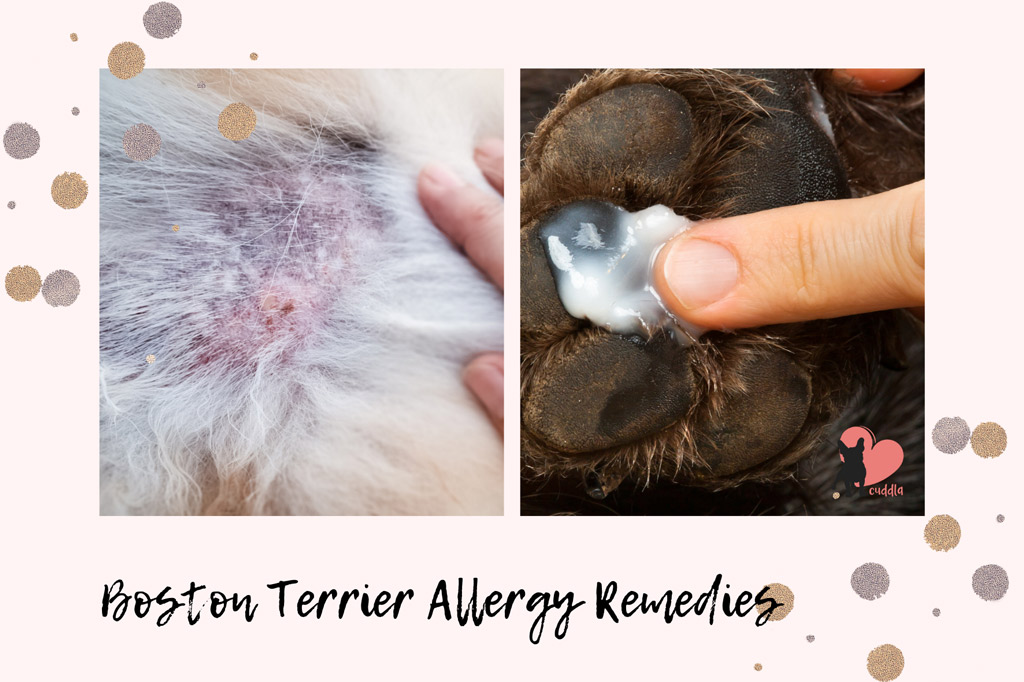
How to Treat Boston Terrier Allergies Naturally
Now, let’s see how to treat each type of allergy naturally:
Natural Treatments for Skin and Environmental Allergies
For skin and environmental allergies, you are going to treat your Boston Terrier’s skin.
The goal is to keep your Boston Terrier’s skin clean with a shampoo bath and then treat his irritated skin with a soothing lotion like coconut oil or aloe vera.
Shampoo Baths
First of all, you want to keep the affected area clean. Then, you want to choose the right shampoo to avoid further irritation.
Avoid shampoos that contain:
- Toxic and harmful ingredients like:
- D-trans Allethrin: It is from a class of synthetic chemicals called pyrethroids, derived from natural chemicals found in chrysanthemums. Synthetic varieties are significantly more potent and persistent than naturally-occurring products and can cause allergic responses. Also a suspected endocrine system disruptor.
- Resmethrin: It is also from the chemical class called pyrethroids.
- Pyriproxyfen and S-Methoprene: It is considered relatively safe with low toxicity. However, data is lacking about their risks when combined with the above chemicals, which may be the case with some dog shampoo.
- Oatmeal: Since some Boston Terriers have allergy problems with grains, they are also likely to have problems with oatmeal shampoos (it’s a grain-based shampoo after all).
Look for shampoos specific for dogs that are/have:
- Free of harsh chemicals (i.e. no sulfates and fragrance).
- Certified organic ingredients (like organic coconut oil).
- Ingredients that help reduce skin inflammation, such as tea tree oil, coconut oil, and aloe vera.
And remember to rinse your pooch thoroughly so there’s no shampoo left!
If your Boston Terrier suffers from itchy skin, shampoo leftovers will only irritate his skin further.
Read also: How Often to Bathe a Boston Terrier?
Finally, after bathing your pooch, you want to apply a soothing lotion like coconut oil or aloe vera.
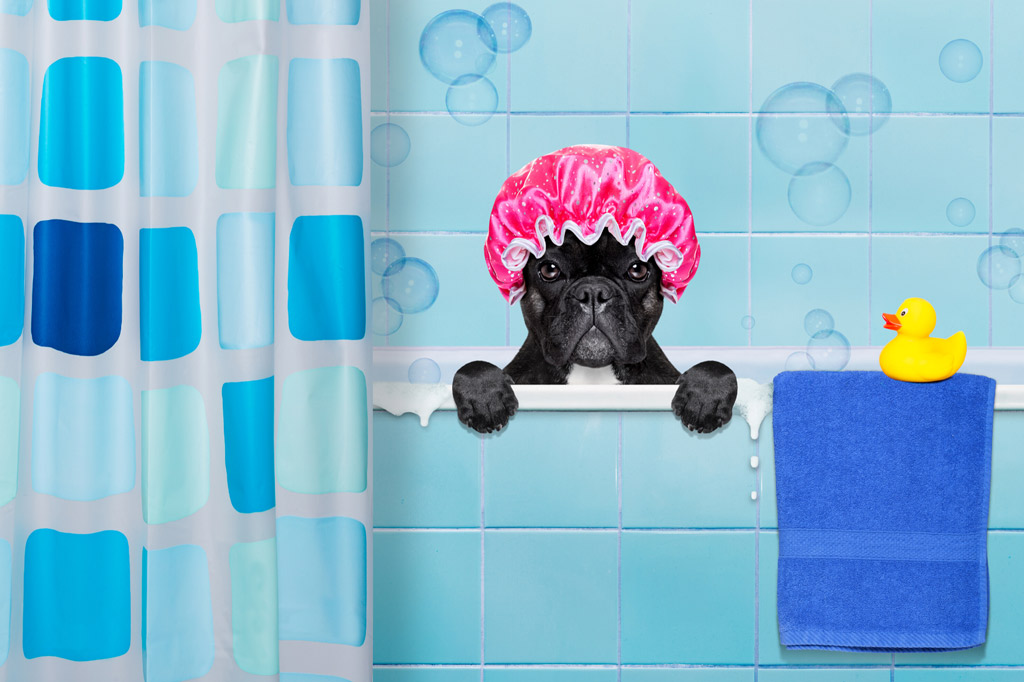
Coconut Oil
Coconut oil has many benefits and is a great solution to avoid dry and itchy skin!
You can administer it orally (as part of your dog’s meal) or directly applied to the skin.
You can rub some coconut oil on your Boston Terrier’s skin after giving him a bath and once he’s dry for the best results.
Here is a list of reasons why coconut oil is good for your Boston Terrier:
- Skin health: It improves skin health and clears up conditions like flea allergies, eczema, itchy skin, and contact dermatitis.
- Antimicrobial properties: Coconut oil is a powerful antimicrobial agent. It has antifungal and antibacterial properties as well. That’s why it helps heal and relieve cuts, hot spots, wounds, stings, and bites.
- Skin moisturizer: This oil is also a rich source of lauric acid. It moisturizes dry skin and gives your dog’s coat a shiny gleam.
- Odour reduction: It reduces doggy odour when applied to their skin; plus doggy breath when used as part of dental treatment.
- Infection prevention properties: It helps prevent yeast infections, particularly candida.
Aloe Vera
Aloe vera acts as a great natural skin soother due to its anti-inflammatory and antibacterial properties.
So, you can apply some aloe vera straight on your Boston Terrier’s itchy hot spot. You can either use the gooey gel from an aloe vera plant at home or buy organic aloe vera gel (this is the one I use for myself and my dogs).

Natural Treatment for Food Allergies
For food allergies, you are going to treat your Boston Terrier’s gastrointestinal tract and gut by improving his diet.
Once you know that your Boston Terrier has a food allergy and your vet has identified the allergens, it’s time to change your Boston Terrier’s diet.
There are two steps to this treatment:
- Avoid foods that contain the allergen (for processed food) or remove the ingredient from your dog’s meals (for homemade meals).
- Decide what type of diet best suits your Boston Terrier. You should always consult with your vet or dog nutritionist to make sure that your dog is getting all the nutrients he needs.
Personally, I recommend following a balanced and species-appropriate diet to boost your dog’s immune system, reduce inflammation and maintain overall health.
Limited Ingredient Diet
A limited ingredient diet usually contains one source of animal protein and one source of carbohydrate.
However, this diet on its own won’t provide all the essential nutrients that your Boston Terrier needs. A limited ingredient diet is best to be used for elimination diet testing, not as a regular diet.
Here are some whole food (whole prey) with limited ingredients:
- Natural Balance Limited Ingredient Dry Dog Food, grain-free:
- Blue Buffalo Limited Ingredient Diet, grain-free:
Hypoallergenic Diet
An hypoallergenic diet is usually used for elimination diet testing.
They typically contain a source of protein that your dog has not previously been exposed to such as venison, rabbit, fish or duck.
These diets don’t contain corn, wheat or ingredients derived from them. But they contain one equally unfamiliar carbohydrate, such as potato or quinoa.
These are some hypoallergenic dog foods:
- Natural Balance Limited Ingredient Dry Dog Food, grain-free: Bison and Sweet Potatoes or Venison and Sweet Potatoes.
- Blue Buffalo Limited Ingredient Diet, grain-free: Lamb and Potatoes or Salmon and Potatoes.
Novel Diet
Similar to the hypoallergenic diets, novel diets offer an unfamiliar source of protein that ranges from buffalo to kangaroo meat.
(Remember that beef and chicken are usually the most common sources of protein in processed dog foods).
Here’s a selection of novel foods.
- Venison and Red Lentils by Purevita Grain-Free Venison Dog Food.
- Duck and Green Lentils by Purevita Grain-Free Duck Dog Food.
- Rabbit and Pumpkin by Earthborn Holistic Venture Grain-Free Dry Dog Food.
- Wild Boar and Butternut Squash by Earthborn Holistic Venture Grain-Free. Dry Dog Food

Free From Diet
If your Boston Terrier is intolerant or allergic to gluten (grains and rice) or a specific type of grain (corn), you can feed him a corn-free kibble diet, for instance.
Just seek out for foods labelled “gluten-free” or “corn-free.” Here’s a dog wholesome (whole prey) grain-free food selection.
In any case, neither ingredient is essential for your Boston Terrier’s nutritional needs.
Read also: Best Diet for Boston Terrier with a Sensitive Stomach.
Homemade Diet
This type of diet stays away from unnecessary carbohydrates (corn, wheat, rice, and soy) but includes beneficial vegetables and fruits.
You can also decide on which sources of protein and fat you want to add to your dog’s meal.
Also, you can easily stay away from artificial fillers, preservatives and flavouring.
Alternatively, here’s a range of commercial raw food, which is freeze-dried. Brands like Stella & Chewy’s uses grass-fed animals, wild-caught fish and organic veggies and fruits.
Read also: Boston Terriers Raw Diet – The Ultimate Guide to Raw Feeding.

